
Upgrade Your LED Display with NovaStar A8s Receiving Card
The NovaStar A8s receiving card is one of the most widely used solutions for modern LED screens. It is small in size, but it plays a big role in how smooth and accurate a display looks.
In this guide, we will take a closer look at what the A8s can do, its key benefits, technical details, price range, and where it stands compared to other NovaStar cards.
Table of Contents
1. NovaStar A8s Receiving Card Introduction
The NovaStar A8s receiving card is designed to bring better image quality and stability to LED displays. It works inside each cabinet, taking the video signal from the controller and turning it into precise instructions for every pixel. The result is smoother gradients, more accurate colors, and consistent brightness across the screen.
Unlike basic receiving cards, the A8s adds advanced processing such as HDR support, low-latency playback, and pixel-level calibration. These features make a visible difference in live events, advertising walls, and control room displays where detail and reliability matter most.
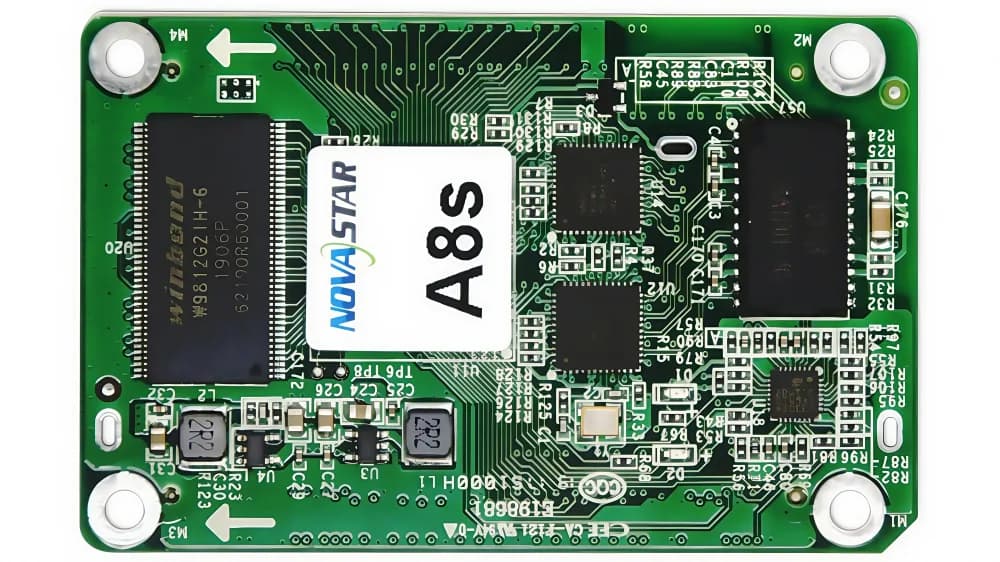
2. Key Benefits of the NovaStar A8s
The NovaStar A8s receiving card was made to solve real problems with LED displays.
Better image quality
The card processes images with 22-bit+ grayscale and NovaStar’s Image Booster. This smooths gradients and improves dark tones. Colors look more even, and small details don’t get lost.
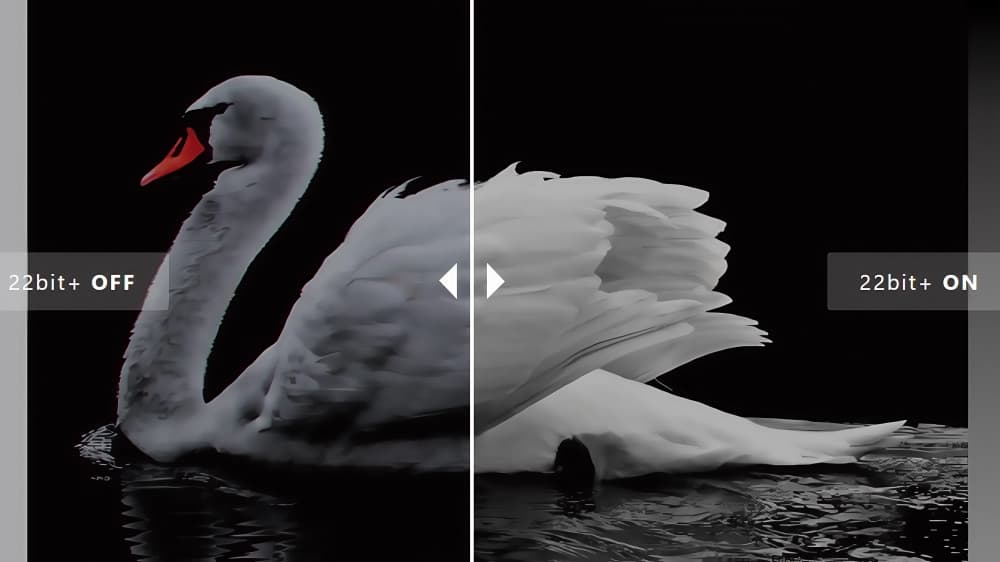
Consistent brightness and color
Pixel-level calibration lets you correct each LED. The screen looks balanced, even when panels come from different batches. This helps when replacing modules or expanding a wall.
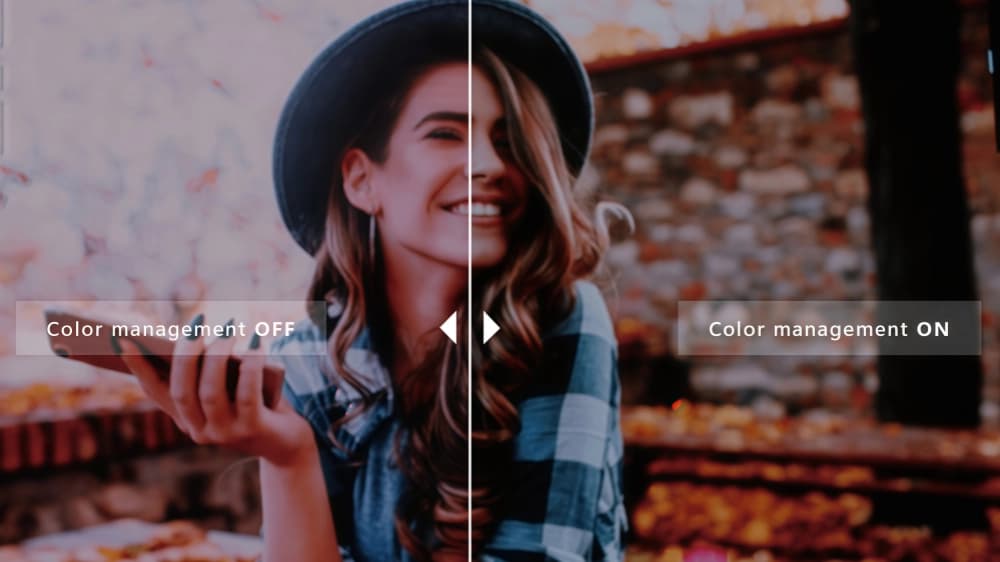
Low delay for live use
In events or broadcasts, video delay stands out. The A8s can cut latency to one frame. What happens on stage stays in sync with what’s on the screen.
HDR support
With HDR10 and HLG formats, the display shows brighter highlights and deeper contrast. Content looks closer to how it was shot.
Flexible layouts
The card supports 3D playback and image rotation, both in 90-degree steps and at custom angles. That makes creative screen designs easier to set up.
Backup functions
If one card or cable fails, backup modes keep the image on. This prevents sudden blackouts during shows or advertising runs.
Maintenance made easier
The A8s stores calibration data and can reload it when a module is swapped. It also reports temperature and voltage through NovaStar software, so technicians can check status without extra tools.
3. Technical Specifications
The table below lists the main specifications of the NovaStar A8s receiving card.
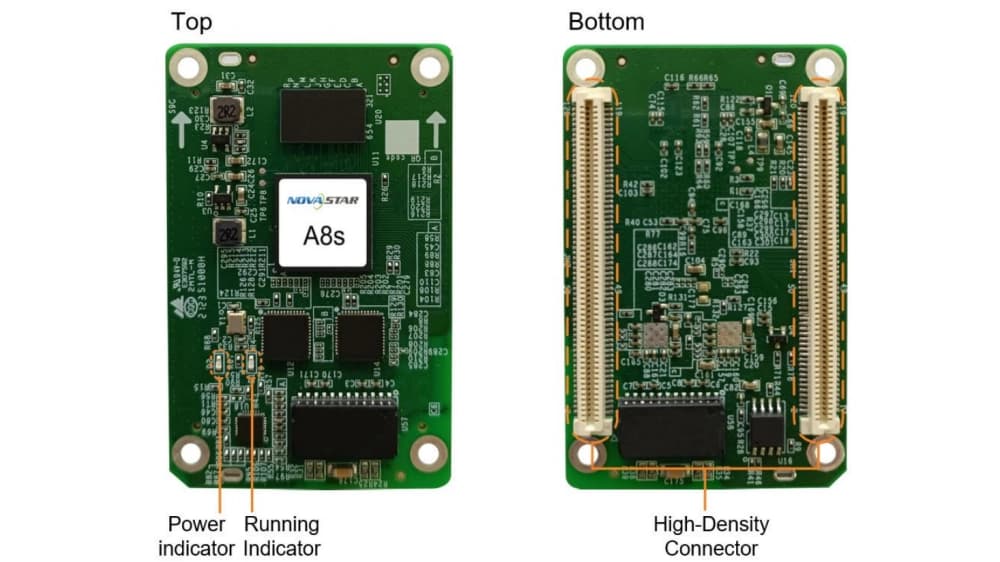
| Category | Specification |
| Performance | Max load: 512 × 384 pixels |
| Processing: 22-bit+ grayscale, LED Image Booster, HDR10/HLG, 3D, image rotation | |
| Electrical | Input voltage: DC 3.3-5.5 V |
| Rated current: 0.6 A | |
| Power consumption: ~3 W | |
| Environment | Operating temp: -20 °C to +70 °C |
| Operating humidity: 10%-90%, non-condensing | |
| Storage temp: -25 °C to +125 °C | |
| Mechanical | Size: 70 × 45 × 8 mm |
| Weight: 17.3 g | |
| Connector: high-density, dust and vibration resistant | |
| Compliance | RoHS, EMC Class B |
4. NovaStar A8s Price
The cost of a NovaStar A8s receiving card is usually around $20–$30 per unit. Prices may shift depending on the order size.
For the most accurate price, we recommend checking directly through register LedInCloud, our online platform. After registering, you can see live pricing, stock status, and bulk order options anytime. This way, you don’t have to wait for a sales quote—you can look it up yourself whenever you need.
5. Comparison With Other NovaStar Receiving Cards
| Feature | A5s Plus | A7s Plus | A8s | A10s Plus-N | NovaStar A10s Pro |
| Loading Capacity (Pixels) | 512×384 | 512×512 | 512×384 | 512×512 | 512×512 |
| Parallel RGB Data Groups | 32 | 32 | 32 | 32 | 32 |
| Serial Data Groups | 64 | 64 | 64 | 64 | 64 |
| HDR Support | × | × | ✓ | ✓ | ✓ |
| Mapping | ✓ | ✓ | ✓ | ✓ | ✓ |
| Temp., Voltage & Comm. Status Monitoring | ✓ | ✓ | ✓ | ✓ | ✓ |
| Dual-Card Backup | ✓ | ✓ | ✓ | ✓ | ✓ |
| Automatic Calibration | ✓ | ✓ | ✓ | ✓ | ✓ |
| Pixel-Level Brightness & Chroma Calibration | ✓ | ✓ | ✓ | ✓ | ✓ |
| Calibration Coefficient Backup | × | × | ✓ | ✓ | ✓ |
| Firmware Program Readback | ✓ | ✓ | ✓ | ✓ | ✓ |
| Individual Gamma Adjustment for RGB | ✓ | ✓ | ✓ | ✓ | ✓ |
| 18bit+ Processing | ✓ | ✓ | ✓ | ✓ | ✓ |
| 22bit+ Processing | × | × | ✓ | ✓ | ✓ |
| Precise Grayscale | × | × | ✓ | ✓ | ✓ |
| Color Management | ✓ | ✓ | ✓ | ✓ | ✓ |
| Full Grayscale Calibration | × | × | × | × | ✓ |
| Shutter Fit | × | × | × | × | ✓ |
| Dynamic Booster | × | × | × | × | ✓ |
6. Applications
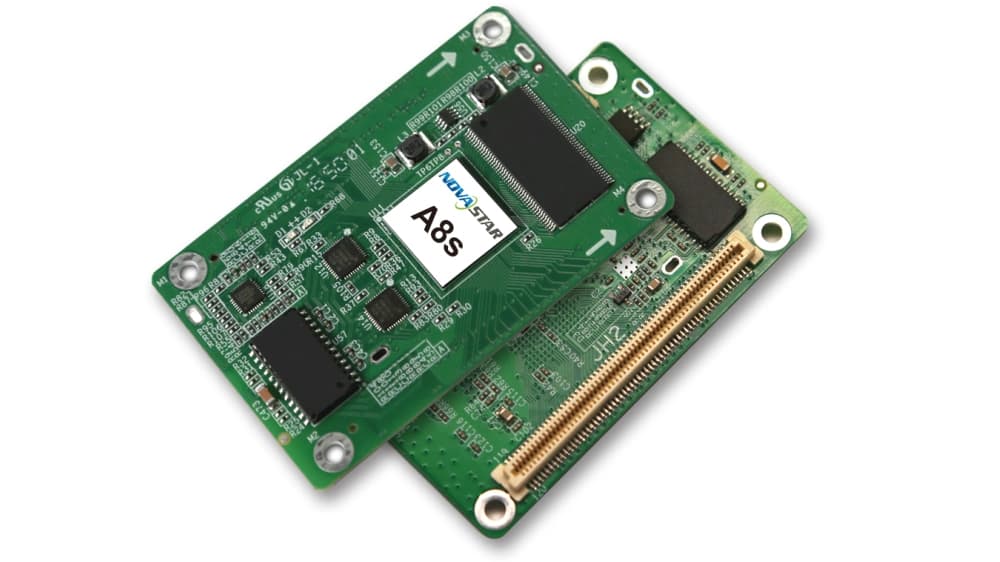
The NovaStar A8s receiving card is used in a wide range of LED projects:
Live events and concerts: Low latency keeps video and stage action in sync. HDR support makes lighting effects look brighter and more dynamic.
Advertising screens: Pixel-level calibration helps every panel look uniform, which is critical for brand visuals. HDR also improves the impact of outdoor ads.
Exhibitions and creative spaces: 3D support and flexible image rotation give designers freedom to build curved, angled, or irregular LED walls without extra hardware.
Control rooms and corporate use: Reliability features such as dual-card backup and loop protection reduce the risk of downtime in 24/7 environments.
7. A8s NovaStar Resources Download
If you need the official NovaStar specifications, manuals, or softwares, the fastest way is through our LedInCloud LED Screen Cloud Platform. After signing up, you can:
- View the latest product datasheets
- Download NovaLCT and SmartLCT software packages
- Check firmware versions and updates
- Access NovaStar product comparisons
This self-service approach means you always get the latest files without waiting for email support.
8. Conclusion
The NovaStar A8s receiving card delivers better images, lower delay, and stronger reliability than standard cards. It is compact, efficient, and widely used in rental stages, advertising, exhibitions, and control centers.
If you are planning an LED project, the A8s is a proven choice. To get detailed specs, real-time prices, and the newest downloads, register LedInCloud. You’ll have everything you need in one place.
